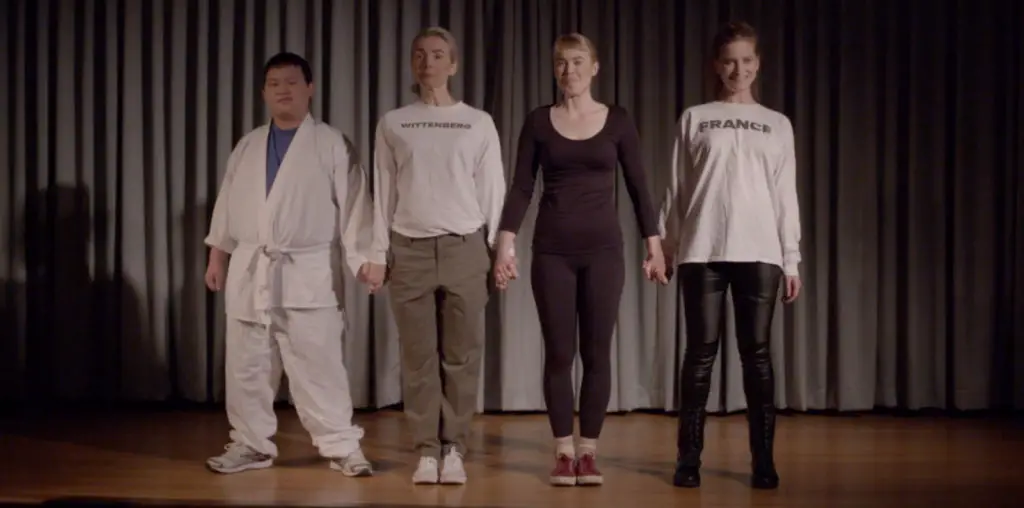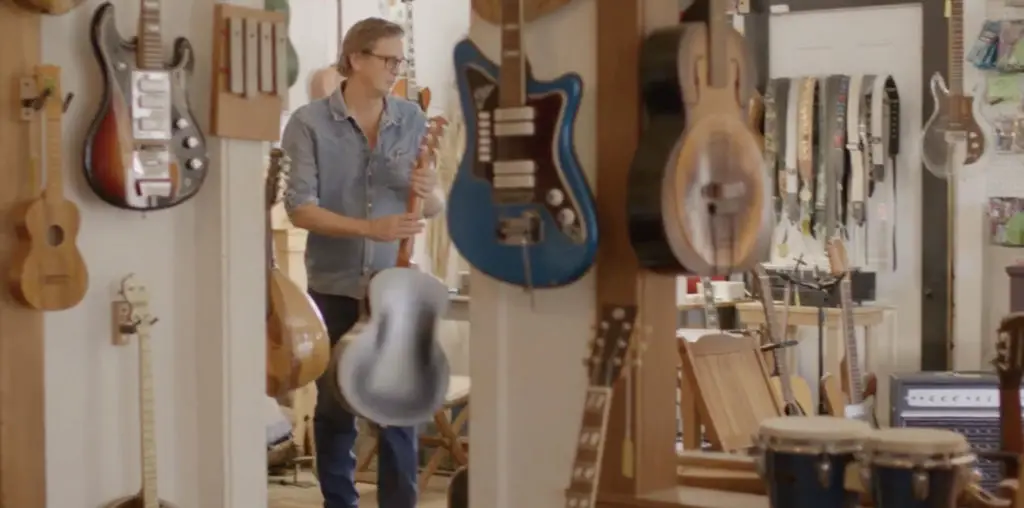
First-time feature directors Jeff Chan and Andrew Rhymer did a bang up job with Plus One, a film that visits all the horrors of wedding season, starring Maya Erskine (Pen15) and Jack Quaid (who you may know from being Meg Ryan and Dennis Quaid’s son but also Hunger Games or Rampage). It also stars Ed Begley Jr., Finn Whitrock and many other wonderful and hilarious actors. I chatted with the directing duo to see what it was like to put together their first big movie, and all that comes along with it.
First of all, the movie is just…it’s hilarious. I loved it. I wanted to know how autobiographical the film is.
Jeff Chan: This is quite autobiographical. Andrew and I, neither of us are married, but we’re in very different places in our relationship lives. Andrew has been with the same person for about 14 years now, but they are not married, and I am sort of the chronically single one. So, together we have sort of a combined our thoughts and feelings and anxieties and philosophies on love to create this movie. And I think I’m a little bit closer to Ben in terms of, of the problems that are holding him back. You know, a guy, they’d be seen too many romantic comedies and has a tendency to flame out of a relationship. Rhymer does not have that problem.
Andrew Rhymer: I think it’s Jeff’s autobiography. It’s biographical in spirit. I think it’s so much of what we’re seeing around us and what we see in our group of friends and the people we know and just what we’ve been feeling for several years and the anxiety about a phase of life and the kind of feeling of looking around no matter what stage you’re at and being like, “Wait a minute, is everyone like suddenly hitting some next level and getting engaged and was I supposed to get on that train at some point?” Then also there’s a part of it that was sort of oddly predictive. We started writing this movie and then started getting invited to so many weddings. Mostly we went to several of our friends’ weddings together but also went separately. And so it sort of became this parade, and as we were working on this movie, we’d come back and be like, “Dude, you will not believe what happened at this wedding.”

“…is everyone like suddenly hitting some next level and getting engaged and was I supposed to get on that train at some point?”
Yeah, I figured, because a lot of this stuff just seems like it could have happened. So I was pretty sure that there was something in there that had some basis in truth. I’m wondering, how did you guys initially meet?
Chan: We have a funny little meet-cute story ourselves. Andrew and I grew up on opposite sides of the country. I grew up in New Jersey, and he grew up in Los Angeles. And, I had a friend, TJ, who right before senior year of high school moved across the country to Andrew’s town and became friends with Andrew. He would call me and tell me, “Oh, you got to come out and visit and meet my new friends.” And I was like, “Alright, sure.” So I flew out a spring break of my senior year of high school and met Rhymer, and he was this super cool guy in my head. Super Cool. LA Dude, he like reminded me of like a Laguna Beach character. I was like this Jersey nerd. After the trip, I went back to New Jersey and told my other friend Matt about TJ’s new friends. I was like, “Oh yeah, I got these new friends, you’ve got this Guy Rhymer, and he was like a cool filmmaker guy.” Anyway, flash forward six months later, Matt and I both found out, we got into NYU, and we got roommate assignments, and Matt called me, and he said, you won’t believe who my roommate is. And he’s like, “That guy, Andrew Rhymer.” So I went to visit Matt at his dorm, and there’s Rhymer, you know, sitting on the floor of his dorm room, unpacking DVDs out of the box. Then I’m like, “Hey, good to see you again.” Very quickly, we sort of formed a little film crew and started making things together. And from there, it snowballed and, and our little group grew and grew, and you know, flash forward 12 years later, we’re all still making stuff together and collaborating together.
Well, that’s awesome. I think personally, that when you’re working with your friends, most of the time, it’s easier than working with people that you don’t know and you can kind of are more comfortable to express yourself and stuff like that.
Rhymer: Yeah, it’s the best. Absolutely. And that was, that was a huge lesson that was nicely reinforced. I mean, just the people that we’d made short films with or Jeff’s freshman roommate was our editor, and you know, some people we knew since sophomore year were various crew members and producers. The production designer is someone we’ve been making short films with for years. And you know, it was just sort of really great. Maya Erskine’s like my little sister I have to deal with all the time. And it’s a great working relationship with everybody when you can just be friends.
Maya Erskine is hilarious by the way. I’m going to ask about her in a little bit. Since I’ve never talked to two directors who worked on the same project before; I want to know why you guys decided to both direct? Then the second part of that question is how does that work on set? Like who does more of what, etc.
Rhymer: Jeff and I started working together in film school, and we worked on something together and separately. And with this one, I think part of the “why” was this is our first movie. And that was a daunting process involving everything from trying to navigate the development maze of Hollywood and find financing and all those kinds of things. I feel like a sort of simple why in our heads was just we were trying to call every possible resource and every possible contact that we all had amongst the two of us and also all of our friends and everyone we knew and anyone we could get on board this ship to try to get this thing to become a reality.
To speak to how Jeff and I are incredibly different people. We’ve known each other for a really long time. We have a very different sort of brains and skill sets. I think sometimes the operating thoughts of co-directors or, or creative partners is, is the kind of like the brother molds, which I’ve never experienced with the sort of like having the same brain kind of thing. And we’re both, uh, you know, very much bring different sensibilities to things. Jeff’s a very astute observationist. He likes to say that he looks at the world through a microscope and I looked at it through a telescope. He is very specific and wonderfully maniacally detail oriented. Like he will not move on from a scene until every single detail is perfect.
And I am kind of like looking much more at a large picture. Like we’re not going to get through the whole day if we like any of those kinds of things, you know. So, it is a very different sort of brain space. I think the wonderful thing is a lot of communication and collaboration. It really brings different things to the fore.

“…we were trying to call every possible resource and every possible contact that we all had amongst the two of us…
Chan: We’ve worked together for so long. Like Rhymer said all the way back to film school, you have that period of time when the stakes are a little bit lower to work out the kinks. And once we were on the set of our first movie, it was, it just felt a lot easier because we had worked together so much. And there’s something really comforting about having your friend standing next to you while you’re doing this. Directing can be a lonely feeling. Creating stuff can be a lonely feeling. And every step of the process from writing, to producing, to directing, Andrew’s always been there. And I’ve always been there for him. And so it just makes it a little bit more comfortable and safer. You just feel like things aren’t as scary and that the responsibilities aren’t as on your shoulders, as they might seem sometimes.
Andrew is a very smart, big picture guy and he’s always got his, his thumb and his eye on the scene as a whole and the movie as a whole and, and can often catch things that nobody else is looking out for because they’re so zoomed in and looking at the picture from a couple of inches away. He’s usually standing back and watching patiently, and he’ll just throw in like, “Hey guys, I don’t think anyone noticed this, but we could just do this.” And everyone’s like, “Oh yeah, yeah, that’s totally right.” We just have different skills. And it’s really nice that there was no big blow up on set, there was never a time when everyone had to sit down and wait for Reimer and me to finish hashing out whose idea was better. It was often, you know, we, we really have a comfortable flow with each other because we’re different.
How did you guys cast? Did you have Maya and Jack and Ed Begley Jr. in mind or how did all of the actors come together?
Chan: I will start by saying we feel like we found and lucked into and were fortunate enough to work with absolutely the best people for all the roles. This movie had a fairly long development and gestation period. We’re not the first independent film to come together a few years ago and then blow up and lose all its financing and then come together again and then, you know, get rescued a third time and then actually make it to the first day of shooting. So the casting and development process has been a long one on this. We partnered with studio 71, who is ultimately the production company that, you know, really came in and rescued this movie from a kind of development oblivion.
We started obviously very seriously looking at who was going to be in this movie. And we had known Maya by that point for a long time, and she was sort of gathering some heat with the things she was doing. And Jack, we…he has a lot of mutual friends, and we were kind of in the same sphere coming out of NYU. Um, Maya, we had been really pushing, and our producers after some convincing really saw it, and I mean she basically had played the part for us in two short films that we had made. We had cast a lot of our friends. They’re a lot of the faces in Plus One. She played a character named Alicia, not Allie.
We actually cast Jack off of Skype. We had been looking for Ben for a very long time, and we’d met a lot of wonderful actors and found a lot of people that we really liked, and we didn’t feel like we quite found it yet. And like three sentences came out of Jack’s mouth over Skype, and we looked at each other like, “yeah, that’s the guy. That’s the dude.” That was pretty wild. The thing with the character of Ben is that we always knew on the page, you, he was pretty frustrating. I mean, he’s the guy that, that is a bit selfish with how he views love. He is looking for the one, and he jumps out of things very quickly and Alice too. We knew we wanted to cast someone that could be innately likable. Someone that would fight against some of the things on the page to bring some earnestness and sympathy to the character. And when you meet Jack Quaid, he’s truly one of the nicest people I’ve ever met in my life.

“…in week two, we opened up the script and started actually to go through the scenes line by line.”
Rhymer: The nicest human being, other than Ed Begley Jr. I think he’s the nicest, it’s true. And, and when we were rehearsing, Jack would be like, “I really hate saying this to her” and we’d be like, “I know you’re not going to like it, but your character has to do this.
Was there a lot of improvisation because it seems like with the dialogue, because it seems so natural, especially between Alice and Ben, um, or was that all written into the script?
Rhymer: I wanna just go on the record and say Jeff, and I are perfect writers, we’re masterminds.
Chan: No, no, absolutely not. Here’s the thing, it might surprise you to know that there actually wasn’t a lot of onset improv. It wasn’t like Jack and Maya were riffing off of each other and improvising with each other at the moment. However, we were very fortunate to get two weeks of rehearsal leading up to production with the two of them. We used the first week just to do improv exercises. And so for example, we would tell the two of them, “Alright, you’re driving back from a wedding, Alice, you really need to pee. Ben, you just need to get home, like you’re late for something.” And we’d just watch them for five minutes play off of each other without a script. And from there we really developed their chemistry.
Then in week two, we opened up the script and started actually to go through the scenes line by line. And in there we would discover a lot of things that maybe weren’t working, not just on a joke level, but full character beats. *SPOILER ALERT* I mean, the original script…this is a spoiler, but Alice and Ben didn’t get together at the end. After we did our first read-through with just the four of us Maya was like, “Well, let me get this straight. My arc is that I get broken up with Nate. I’m really sad about it. I team up with my friend. I fall in love with him and, uh, then he breaks up with me and then that’s it?” And we’re like, “Yeah, that’s not good.” and ended up writing the ending that’s in there now. it was, you know, so everything from, from jokes and little bits of dialogue to full-on character arc beats came out of the four of us working together and not just me and Rhymer being like, “This is how it is, and it’s perfect.”
Yeah. Well I mean that’s awesome that you guys got to do a rehearsal because that doesn’t happen too often. I really hope that a lot of people see this because I think it’s I think it’ll do well. I’m happy for you guys — great first feature.


